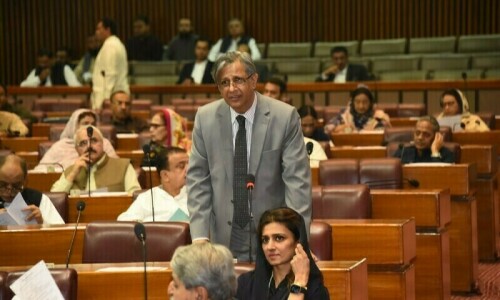ONE is astonished to see, that despite the clear stipulations of the Constitution on the issue, the caretaker governments, whether federal or provincial, are authorised to draw funds from the consolidated fund for a period exceeding four months, which the governments mentioned totally ignore.
It was in the case of ‘Khawaja Muhammad Asif versus Federation of Pakistan’ where the learned judges held: “The caretaker government also lacks the mandate of the majority of people, which is to be acquired by elected government through the general elections. Therefore, if a caretaker government is allowed to exercise complete powers available to an elected government, it may make attempt to continue to remain in office for a longer period of time or may take such decisions which may cause problems for the future elected government.”
The Election Act 2017 in Section 230 clearly details the functions of a caretaker government, specifying what the caretaker government shall not do. It categorically provides that day-to-day working of the government could be performed by the caretaker government but that it could not take any major policy decisions or make policies or enter into major international negotiations, etc.
However, by an amendment amongst the various made in the Election Act by the Election (Second Amendment) Act, 2023, Section 230 was amended to the extent that subsection (1) and (2) would not apply to the caretaker government where they need to take action or decisions regarding existing bilateral or multilateral agreements or projects already initiated or international commercial transactions, and under the Privatisation Commission Ordinance.
Thus, the government in its caretaker capacity was, except for the proviso, restricted from taking actions as provided in sub-section (2) (a) to (g) of Section 230 of the Election Act. We see numerous transfers and postings, raise in pay and salaries, taking policy decisions undermining not only the Election Act as amended from time to time but also the Constitution of the Islamic Republic of Pakistan.
If a caretaker set-up is allowed to exercise complete powers it may try to remain in office for a longer period.
Importantly, the Constitution was not amended nor was the Election Act, 2017 amended to bring in the power and authority of the caretaker government to go beyond the period as prescribed by the Constitution, namely, either 60 days or 90 days for the conduct of the election to either the National Assembly or the provincial assembly.
The Constitution’s Article 86 in relation to the federation and Article 126 in relation to the province provide that, the federal government in relation to financial matters, at any time when the Assembly is dissolved, can authorise expenditure from the federal or the provincial consolidated fund, as the case may be, to the caretaker set-up, for a period not exceeding four months in a financial year. The Punjab Assembly was dissolved on Jan 14, 2023. The period of four months expired on May 14, 2023.
The Punjab government continues to draw money beyond the authorised period for over six months without constitutional authorisation or power.
The said Punjab government has not approached any judicial forum for financial withdrawal and continues to sit without authority, despite the judgement in the case of ‘Muhammad Sibtain Khan versus the ECP’. Similar is the case with the KP government which continues to also violate the Constitution, drawing funds without authorisation.
The case of the federal government and the Sindh and Balochistan governments also fall within the same category, namely Articles 86 and 126 of the Constitution, which restrict the expenditure from the federal or the provincial consolidated fund for a period beyond four months.
The command of the Constitution is absolutely clear when Articles 86 and 126 use the words, “… in respect of estimated expenditure for a period not exceeding four months [italics added] in any financial year…”. In this case also, the said governments continue to violate the Constitution, namely that they continue to go beyond the mandate given by Section 230 of the Election Act, 2017, when they, instead of taking care of day-to-day matters, are indulging in those prohibited by Section 230(2).
Further the mandate and authorisation for drawing from the consolidated fund has now expired. The question is whether withdrawals of funds from the ‘consolidated fund’ can be termed as lawful, especially when the Constitution categorically provides that such authorisation does not exceed four months.
Article 86 commences with the word “Notwithstanding”, clearly indicating that the other provisions of the Constitution cannot be looked into except Article 86. It further stipulates that the outgoing government could authorise expenditure to the caretaker set-up for a period of four months. Thus, it is that the elected government can authorise the withdrawals, but not beyond four months.
The Constitution thus presumes that elections would take place within the prescribed period of 60 or 90 days, and therefore, the period of four months has been prescribed. The caretaker set-up has no jurisdiction to cause the withdrawals from the constitutional fund. The set-up thus continues to violate the provisions and goes beyond its mandate.
The judgement of Khawaja M. Asif referred to above basically relates to transfer and postings, but also provides that no civil servant would be transferred or posted except in extraordinary circumstances; further that as the state must be run by the chosen representatives, no decision which causes permanence including policies impacting the future of the country can be made.
The drawing of funds by the present government and the taking of decisions which are impacting the future of the country, without the elected members of parliament, is surely a serious violation of the law but they continue to do so without remorse.
The writer is a former high court judge and former attorney general of Pakistan.
Published in Dawn, January 1st, 2024












































Dear visitor, the comments section is undergoing an overhaul and will return soon.